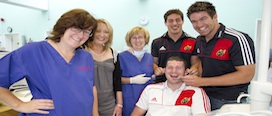2012 Press Releases
Avail of a free mouth cancer screening this Wednesday

Approximately 10,000 people received free examinations nationally last year and dental professionals around the country, including the Cork University Dental School and Hospital, will offer the service once more this year.
“The most important message to remember”, says Dr Eleanor O’Sullivan, Cork University Dental School and Hospital and Chair of Mouth, Head & Neck Cancer Awareness Ireland “is that any unexplained lesion present for more than three weeks should be referred for further investigation”. Further details are available on the dedicated website www.mouthcancerawareness.ie
Those wishing to attend Cork University Dental School & Hospital, Wilton for examination should ring the dedicated phone line for an appointment on 021-4901169. This number will be operational from 10am to 4pm, from 12th -18th September inclusive. Those wishing to attend their local dentist should visit the above website to see if they are participating and to check times.
The screening will be simple, painless and take about five minutes. Follow-up appointments will be made for anyone who needs further investigation. Visitors to the Cork University Dental School and Hospital should go to the CUH complex in Wilton.
Mouth, head and neck cancer is on the increase in Ireland yet remains a relatively unknown disease. It can affect the lips, gums, cheek, tongue, palate, tonsils, throat, salivary glands, sinuses, nose and larynx (voice box). Symptoms include ulcers that won’t heal, white, red or speckled patches, neck lumps or swellings and difficulty swallowing. Tobacco and alcohol are major causes of mouth cancer and international research indicates that individuals with an increased risk of oral cancer (males over 40 years, consuming more than 28 units of alcohol per week and smoking more than 20 cigarettes a day) rarely go to the dentist.
The prognosis for early oral cancer is extremely good, with five year survival rates of 80% to 90%. Survival rates, however, show a progressive reduction with advanced stage, with rates as low as 10% to 35% reported for advanced lesions. In Ireland, head and neck cancer represents approximately 2% of cancer patients (registrations) and is responsible for 1.5% (or 150) of cancer deaths each year. “It kills more people than malignant melanoma, Hodgkins’ disease or cervical cancer,” says Dr Eleanor O’Sullivan “and yet it has a low profile among the general public and even among health care providers although it is the eight most common cancer world-wide.”
Many head and neck cancers can be detected by a relatively simple painless oral examination. If detected early, minimal surgical intervention generally results in good outcomes. “All these facts should make oral cancer very rare and easily treated in Ireland in 2012. Unfortunately, many patients still present with advanced lesions and for this reason, the five year survival rate has improved little in the last 40 years, remaining at less than 50%.”
Dentists are currently the only primary health care professionals trained specifically in oral cancer examination. However, only a third of the adult Irish population visit a dentist annually, while less than 50% visit bi-annually. In fact, attendance rates among older adults, medical card holders and those with no natural teeth are even lower. Most (96%) people with full dentures feel that they do not need to visit a dentist according to the Oral Health Report, 2007.
The Mouth Cancer Awareness Day has the support of the Irish Cancer Society, Irish Dental Association, Irish Dental Health Foundation, MHNCAI, and both Dental Schools. Expressions of support have also been received from the Irish Pharmacy Union and from general medical practitioners nationally. A series of free educational lectures on oral cancer examination technique, potentially sinister signs and symptoms and lesion recognition will be held in various centres in early September to support participating healthcare professionals.
